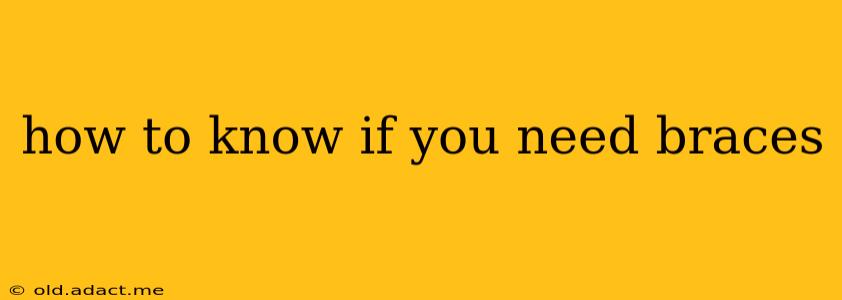Deciding whether or not you need braces is a crucial step in achieving a healthy and confident smile. While a perfectly straight set of teeth is often the goal, the need for braces extends beyond aesthetics. Orthodontic treatment can address a range of functional issues that impact your oral health and overall well-being. This guide will help you understand the signs that suggest you might benefit from braces and what steps to take next.
What are the Signs You Might Need Braces?
Several factors indicate the potential need for orthodontic treatment. These signs aren't always obvious, and some might only be detectable by a professional dental examination. Let's explore some key indicators:
-
Overcrowding: If your teeth are too crowded, they may overlap, making it difficult to clean effectively and increasing the risk of cavities and gum disease. This is a common reason for seeking orthodontic treatment.
-
Spacing: Gaps between teeth, while sometimes considered aesthetically pleasing, can also indicate an underlying orthodontic issue. Significant spacing can affect chewing and speech.
-
Crossbite: This occurs when your upper teeth fit inside your lower teeth, rather than the other way around. This can lead to uneven jaw growth and problems with chewing and jaw function.
-
Underbite: An underbite is a condition where your lower jaw juts out beyond your upper jaw. This can impact your bite and potentially lead to temporomandibular joint (TMJ) disorders.
-
Overbite: An overbite is characterized by your upper teeth significantly overlapping your lower teeth. Severe overbites can affect chewing and speech, and may also lead to TMJ issues.
-
Open Bite: This occurs when there's a vertical gap between your upper and lower front teeth, even when your mouth is closed. This can affect speech and make it difficult to bite into food properly.
-
Difficulty Chewing or Biting: If you consistently struggle to chew food effectively or experience pain while biting, it could be a sign of a misaligned bite that braces can correct.
-
Speech Problems: Certain bite issues can affect the way you speak, leading to lisps or other articulation difficulties.
-
Jaw Pain or Clicking: This may be a symptom of temporomandibular joint (TMJ) disorder, which can sometimes be related to misaligned teeth and improved with orthodontic treatment.
How Can I Tell if My Teeth Need Straightening? (Addressing Common Concerns)
This question often arises from individuals considering cosmetic improvements. While aesthetics are a valid consideration, remember that the primary focus should be on overall oral health. Straightening teeth not only enhances appearance but also improves oral hygiene, preventing future problems.
What are the benefits of getting braces?
The benefits of braces extend beyond a beautiful smile. They improve oral hygiene by creating spaces that allow for easier cleaning and decrease the risk of gum disease and cavities. Additionally, corrected bites lead to improved chewing, speech, and jaw function, reducing the risk of TMJ disorders and long-term dental problems.
What should I do if I think I need braces?
Scheduling a consultation with an orthodontist is the next crucial step. The orthodontist will perform a thorough examination, take X-rays, and assess your specific needs. They'll discuss the best course of action, including the type of braces that would be most suitable for your situation, and explain the treatment plan and anticipated timeline. This professional consultation is vital for accurate diagnosis and personalized treatment planning.
What are the different types of braces?
Several options exist, ranging from traditional metal braces to clear aligners like Invisalign. Your orthodontist will recommend the most appropriate type based on your individual needs and preferences. The choice depends on factors like the severity of the misalignment, your age, and your lifestyle.
Conclusion: Prioritize Your Oral Health
The decision of whether or not to get braces should be based on a combination of aesthetic preferences and a thorough assessment of your oral health. Addressing bite and alignment problems early can prevent significant issues down the line. By scheduling a consultation with an orthodontist, you can gain a clear understanding of your options and make an informed choice that supports your long-term oral health and well-being. Remember, a healthy smile is a confident smile!
